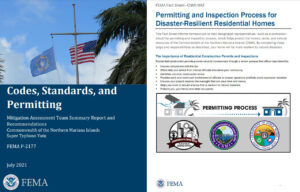
The Commonwealth of the Northern Mariana Islands receives new tools for disaster mitigation
As the International Code Council’s government relations manager assigned to the Commonwealth of the Northern Mariana Islands (CNMI), I have been closely monitoring developments after Super Typhoon Yutu struck in October 2018. This Building Safety Journal article published in June 2019, provides an interesting eyewitness account of the destruction caused by this Category 5 storm as written by Federal Emergency Management Agency (FEMA) Region IX liaison Forrest Lanning.
In 2020, FEMA deployed a Mitigation Assessment Team (MAT) to work closely with CNMI officials to conduct field investigations to understand building performance, determine causes of building failures and successes, and make recommendations for rebuilding. These efforts have resulted in Summary Reports documenting observations and recommendations as well as three Fact Sheets and two Recovery Advisories.
 The Code Council was invited to review and contribute to two of these documents, the Summary Report (SR) 1 Codes, Standards, and Permitting (FEMA P-2177) and the Fact Sheet (FS) 3 Permitting and Inspection Process for Disaster-Resilient Residential Homes, which are described below.
The Code Council was invited to review and contribute to two of these documents, the Summary Report (SR) 1 Codes, Standards, and Permitting (FEMA P-2177) and the Fact Sheet (FS) 3 Permitting and Inspection Process for Disaster-Resilient Residential Homes, which are described below.
The Summary Report FEMA P-2177 focuses on CNMI’s adoption, use and enforcement of hazard-resistant provisions of building codes and standards and provides five recommendations under “Codes and Standards” and eight recommendations under “Permitting and Code Enforcement.” According to FEMA, modern and well-enforced building codes are the most effective means to prepare communities for natural hazards. The report’s recommendations include long-term strategies to reduce future damage and impacts from storms and improve community resilience with recommendation 1 being: “Adopt the latest International Codes (I-Codes) on a recurring three-year basis, with amendments that are specific to the Territory.” Note that CNMI adopted the 2018 International Building Code (IBC) through Public Law No. 21-14, as signed by the governor on Dec. 19, 2019. As noted in the report, “This was a positive step toward long-term resilience as these codes were the latest available at the time and presented a significant upgrade from the previously adopted 2009 IBC and 2009 IRC.” Within the recommendations, resources are provided including the Code Council’s International Accreditation Service Building Department Recognition program, ICC Evaluation Service, and the Code Council’s consulting services, Learning Center, and plan review records and checklist.
A key recommendation within the report is that the CNMI Building Safety Code Division should widely share the fact sheet titled, Permitting and Inspection Process for Disaster-Resilient Residential Homes, 2021. This fact sheet is presented in a user-friendly format with graphics, clearly identifying the needed steps to ensure that homes are permitted and inspected properly, explaining why the steps are needed, and who is responsible for what. Having everything in one place presented in an easy-to-understand format will be very effective in convincing homeowners of the importance of obtaining a permit and building in accordance with current codes.
These valuable materials ultimately resulting from Super Typhoon Yutu can be used by both the CNMI government and citizens to ensure that rebuilding is done safely through modern building codes, proper permitting and enforcement. Providing these tools for rebuilding is sure to make a difference and better prepare the region for the next disaster.








